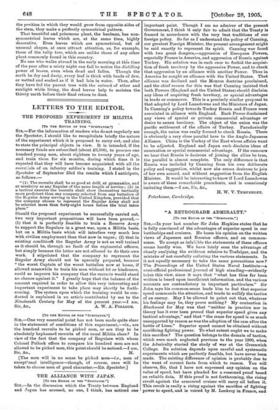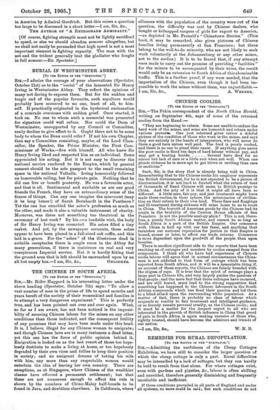[To TEl EDITOR Or THE "SPECTATOR."]
Sra,—In your last number Sir John Hopkins states that he is fully convinced of the advantages of superior speed in our battleships and cruisers. He bases his opinion on the written views of Japanese and Russian officers, and on common- sense. To accept as infallible the statements of these officers seems hardly wise. We have lately seen the advantage of closely analysing the evidence relative to Trafalgar, and the mistake of not carefully collating the various statements. Is it not equally necessary to take the same precautions now P The Proceedings of the United States Naval Institute—a semi-official professional journal of high standing—evidently takes this view, since it says that " what has thus far been written is based upon insufficient information, and the various accounts are contradictory in important particulars." Sir John says his common-sense leads him to feel that superior speed commands the situation, and tends to nullify the tactics of an enemy. May I be allowed to point out that, whatever his feelings may be, they prove nothing? My contention in Blackwood for May was that "neither in practice nor in theory has it ever been proved that superior speed gives any tactical advantage," and that "the craze for speed is as much unsupported by reason as was the adoption of the ram after the battle of Lissa." Superior speed cannot be obtained without sacrificing fighting power. To what extent ought we to make this sacrifice P The question belongs to the domain of tactics, which were much neglected previous to the year 1900, when the Admiralty started the study of war at the Greenwich College. Its solution depends upon careful and systematic experiments which are perfectly feasible, but have never been made. The existing difference of opinion is probably due to the want of correct facts from which to reason. You will observe, Sir, that I have not expressed any opinion' on the value of speed, but have pleaded for a reasoned proof based on reliable data. If this proof is not forthcoming, the rising revolt against the armoured cruiser will carry all before it. This revolt is really a. rising against the sacrifice of fighting power to speed, and is voiced by M. Lockroy in France, and in America by Admiral Goodrich. But this raises a question too large to be discussed in a short letter.—I am, Sir, &c., THE AUTHOR OP " A RETROGRADE ADMIRALTY."
[Of course, fighting strength must not be lightly sacrificed to speed, or else we should abandon armour altogether, but we shall not easily be persuaded that high speed is not a most important element in fighting capacity. The man with the net and the trident generally beat the gladiator who fought in full armour.—En. Spectator.]



















































 Previous page
Previous page